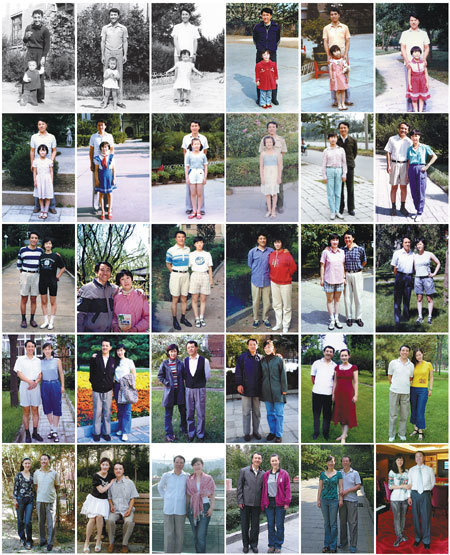How do i love thee?
 0 Comment(s)
0 Comment(s) Print
Print E-mail China Daily, January 21, 2013
E-mail China Daily, January 21, 2013
 |
|
Zhao Mengmeng makes an album of 30 photographs taken with her dad around the same date for 30 straight years as a remarkable expression of love to her parent. |
We asked a cross-section of people if they say 'I love you' to their parents, spouses and children.
ZHANG XUE
22, salesman, Beijing
"I say 'I love you' to the people I love, including my parents. I live far away from my parents and know that they miss me a lot and that's why, now and then, I feel I need to tell them I love them. I don't find it difficult to say the words and I can see that they're happy and moved when they hear it. But they never say the words back."
CHEN YUDA
34, civil servant, Shaoxing, Zhejiang province
"I am reluctant to say 'I love you'. Perhaps it has something to do with our Chinese culture. Saying such words seems awkward in my family. I don't think it's necessary to speak out about love, as long as I have done my duty in supporting my family and working at all our relationships. I am more physical with my daughter, I hug her and she hugs me back. But it's interesting that my 5-year-old daughter often says 'I love you' to her mother, but never to me - probably because I don't live with her all the time. There is no physical expression of love to my parents, but I show my love through buying them things and visiting them as often as possible. I let my parents know that as they get old, I will always be there for them. That's how they know I love them."
Related: Learning the language of affection
LI SHENG
68, retired, Beijing
"I don't say 'I love you' to my family. I don't find it hard but it's just not necessary. We're close and love each other enough so it's not necessary for us to express it that way. You can say sweet things and promise a lot, but words are empty. It's what you do that really makes an impression."
CAO LEI
32, teacher, Beijing
"If I say 'I love you' to my parents, they'll be shocked! They'll think something must have happened to me. So I don't want to scare them. Rather, I'd show them my love through actions. That's the sort of love and filial piety their generation is more familiar with. And they can sense it through your behavior. But I'm a teacher, so I encourage my students to express their love more directly to their parents. Everything changes with time."
REN RUOPING
70, retired, Beijing
"When my children and grandchildren were very young, I did say 'I love you' to them. Not anymore. When they're old enough to understand your love for them, it's better for them to sense it through our interaction. It's when they don't understand your feelings for them that you need to say it out loud. I think that's what we Chinese do."
LU JIANLI
56, farmer,
Mashan county, Nanning, Guangxi Zhuang autonomous region
"I have never said 'I love you' to my family, and I don't think I will in the future. Saying it aloud is embarrassing for me. I don't think it's necessary to say it out loud. Actions are more important than words, and I show my love to my family through my deeds. For example, I try my best to take good care of my little grandchildren to show my daughter I love her. In the past, when we were poor, I would visit my parents often and take my children along so they can chat and stay with them. Making my parents happy was the best way to show them my love."






Go to Forum >>0 Comment(s)